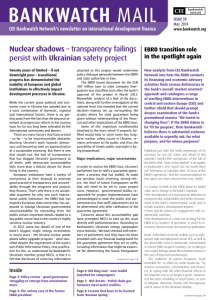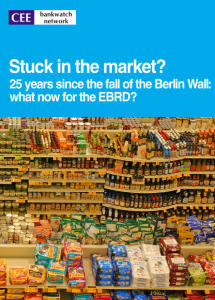EBRD transition role in the spotlight again

Bankwatch Mail | 14 May 2014
New analysis from CEE Bankwatch Network of how the EBRD conducts its financing and economic advisory activities finds serious deficiencies in the bank’s overall ‘market-oriented’ approach and catalogues a range of startling EBRD interventions in central and eastern Europe (CEE) and further afield that should prompt deeper examination of the bank’s promotional mantra “We invest in changing lives”.
This article is from Issue 59 of our quarterly newsletter Bankwatch Mail
Browse all articles on the right
If the EBRD claims to be ‘fit for purpose’, then Bankwatch believes there is substantial evidence available to urgently ask: for what purpose, and for whose purposes?
Published just after the tenth anniversary of EU accession for ten CEE states and ahead of this autumn’s twenty-fifth anniversary of the fall of the Berlin Wall, ‘Stuck in the Market?’ (pdf) is an update to Bankwatch’s 2011 report ‘Are we nearly there yet? Dilemmas of transition after 20 years of the EBRD’s operations’. And the recommendations of that report are more relevant than ever, chiefly:
- a serious re-think at the EBRD about its added value and a change in the bank’s mandate.
- the development of a more precise definition of environmental sustainability and better measurement of the bank’s environmental, social and, in certain countries, development impacts.
- more specific criteria for engagement with undemocratic countries.
- the development of a clear exit strategy for the EBRD in its countries of operation, to avoid its increasing ‘mission creep’ and speed up graduation.
Harsh, embedded economic realities such as widespread, high unemployment across CEE, as well as the discernible trend of democratic retrenchment in several EBRD recipient countries, are resulting in very mixed feelings about the transition process in this year of important anniversaries.
The ‘resilience’ of eastern Europeans, much remarked on – or relied on, some would say – by western economists, commentators and financiers, in coping with the often dramatic effects of the financial crisis is no longer a given. Social unrest has been mounting in recent times, as seen in Bulgaria, Romania, Bosnia and Herzegovina, and of course at the Ukrainian Maidan.
“However,” remarks Pippa Gallop, Bankwatch’s Research coordinator and author of the new report, “the EBRD’s operations seem to be proceeding largely unchanged: promote the private sector and hope that everything else will follow. The bank is firmly ‘stuck in the market’, seeing it as the solution for everything and lacking the necessary caution to recognise that ‘promoting the private sector’ without adequate public participation and safeguards against corruption and human rights abuses is likely to be counterproductive.”
Did you know?
‘Stuck in the market?’ provides a wealth of evidence that illustrates how EBRD logic and action is too often working against the interests of people – though not certain people – and the environment.
- ‘Not an efficient approach’ – the words of the 2013 EBRD Transition Report following the decision to introduce free public transport for all residents of the Estonian capital Tallinn. The EBRD docked Estonia a ‘transition’ point on urban transport for this misdemeanour.
- The same 2013 EBRD report praised the launch of the privatisation of HZ Cargo, Croatia’s rail freight operator, as a positive development. The sale later collapsed in January 2014, raising the question of whether it wouldn’t have been better to invest effort into improving the existing management of the company instead of privatising for privatisation’s sake.
- The Far Eastern Rail project in Russia was granted an EBRD loan of EUR 133 million in December 2013, yet the bank has been unwilling to list the name of the Far Eastern Rail Ltd owner on its website. Forbes reports that the company was registered in Cyprus in November 2013 and that 92.2 percent of the company belongs to Linea Ltd (Bermuda) and 7.8 percent to Altmirco Enterprises Ltd. Billionaire Andrei Melnichenko, who has hit the headlines with his submarine-like yacht and extravagant wedding, reportedly owns Linea, while his long-term associate Vladimir Rashevsky owns Altmirco.
- In 2010 the EBRD approved a EUR 37 million loan for the redevelopment of the Sveti Stefan island hotel complex in Montenegro by the Greek shipping company Restis Group. The deal became controversial as Restis allegedly failed to keep to deadlines and constructed buildings outside of the approved zones. In July 2013 the controversial billionaire Victor Restis was arrested on suspicion of fraud, throwing the project into further disarray.
A host of other egregious EBRD projects and questionable beneficiaries, as well as critique of the EBRD’s make-it-up-as-you-go-along approach to changing people’s lives across eastern Europe and in new recipient countries such as Egypt, can be found in the new report. Read it at: https://bankwatch.org/EBRD-stuck-in-market
Theme: Social & economic impacts | Other harmful projects
Tags: BW Mail 59 | democracy | development | privatisation | social impacts | transition
Never miss an update
We expose the risks of international public finance and bring critical updates from the ground. We believe that the billions of public money should work for people and the environment.
STAY INFORMED

